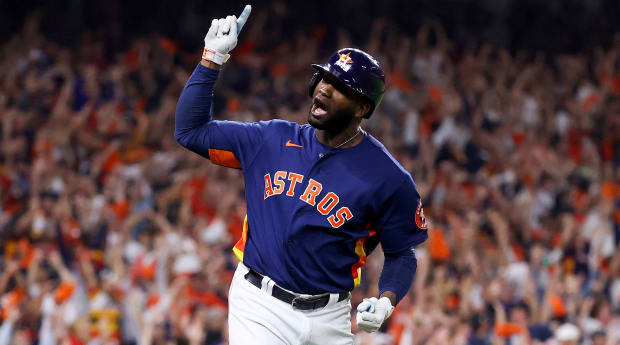
Troy Taormina/USA TODAY Sports
HOUSTON — Framber Valdez dealt, Yordan Alvarez sent a baseball to the moon and as a result, the Astros beat the Phillies 4–1 in Game 6 of the World Series to clinch its second championship in franchise history.
This was the fourth time in the past six season that the Astros had reached the World Series, but in their previous two trips, against the Nationals in 2019 and last year vs. the Braves, they were upset by two weaker teams that weren’t expected to make it as far as they did. This time, though, they came back with three straight wins after falling behind in the series, 2–1, each with key moments from some of the team’s younger stars, who weren’t around for the first title, in ’17. In addition to Valdez and Alvarez, that group of newer stars includes rookie shortstop Jeremy Peña, righthander Cristian Javier and center fielder Chas McCormick, among others.
Here are three immediate takeaways from Houston’s championship-winning game:
Pulling Zack Wheeler haunts the Phillies
Let’s get all the usual caveats out of the way upfront: Hindsight is 20/20. It’s much easier to pick at a decision after it backfires than it is to actually make it in the moment. There’s no way to know how the counterfactual here might have played out. Yet. Phillies manager Rob Thomson’s choice to pull Zack Wheeler for José Alvarado felt questionable even as it was happening, and, well, you saw the result.
Wheeler had looked extremely sharp in his first few innings of work. In order to give him two extra days’ rest, Philadelphia chose to start him in Game 6 instead of Game 5, and that seemed to work. Wheeler came out throwing harder on Saturday than he had at any point in his last start. After his fastball sat at 95 mph in Game 2, he didn’t dip below 98 once in the first inning of Game 6, and he was dealing.
But then Wheeler found himself in a spot of trouble with the Phillies clinging to a 1–0 lead in the sixth inning. After hitting a batter and getting a forceout, Wheeler allowed a single to Peña. That put runners on first and third with one out and one of the most fearsome hitters in the league coming to the plate: Yordan Alvarez.
Yet there was a lot of context that complicated the situation. Sure, Alvarez is an incredibly talented hitter whom Wheeler was about to face for a third time… but the lefty had been struggling at the plate somewhat over the last few weeks and had not done anything in his first two plate appearances tonight. Meanwhile, Wheeler was at just 70 pitches, and his velocity had barely dipped at all. (The last fastball he threw to Peña was 97.4 mph: harder than anything he’d thrown at any point in his last start.) Wheeler was likely approaching the end of his night regardless. But to pull him here—rather than giving him a chance to get out of the jam—seemed premature.
Now, Thomson’s aggressive bullpen management was a key part of what kept the Phillies playing this deep into November. But this choice felt like a particularly dubious one.
Yordan Alvarez is the truth
And here’s what happened when Alvarado came in to face Alvarez.
I’m not sure there’s much to say about this home run, other than that it was hit so hard that the official distance of 450 feet feels like a misprint, and (obviously) that it won the game.
Jeremy Peña makes the difference
Peña got a few scattered “MVP” chants at Minute Maid Park on Saturday: tongue in cheek, perhaps, but the rookie shortstop has made himself look every bit the part this week.
With two singles—including the one that represented the go-ahead run—and some slick work in the field, he rose to the occasion, just as he has throughout the series. He became the first rookie to have a hit in each of his first six World Series games. After in his three games after the Astros fell behind 2–1 in the series, Peña went 7-for-13 (.538) with a homer and three runs scored.
Not bad for a rookie.







